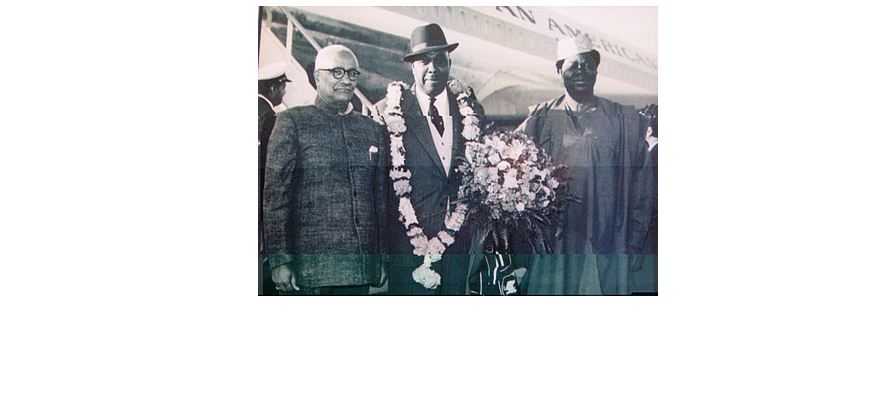Remembering Adetokumbo Ademola (February 1, 1906 - January 29, 1993)
Sir Adetokunbo Ademola (centre) with the Chief Justice of India, Shri B.P Sinha on a visit to India
On this day in 1993, Sir Adetokumbo Ademola, Nigeria's first indigenous Chief Justice, passed away after a long and illustrious life. He was born into the family of the Alake of Egbaland (a Yoruba clan largely based in Abeokuta, Ogun State). After studying law at the University of Cambridge, he was called to the bar in London in 1934 and quickly rose through the ranks of the Nigerian judiciary, becoming Chief Justice for Western Nigeria in 1955 and Chief Justice of the Federation in 1958, two years before the country's independence. Adetokumbo Ademola played a vital role in establishing the Nigerian Law School (at which all Nigerian lawyers are trained) and in shaping the country's history, as an obituary published in the Independent newspaper highlights:
In the first military coup d'etat in Nigeria in 1966, it was Adetokunbo Ademola who, with the British High Commissioner in Lagos, saved Nigeria from disintegration. When Major-General Thomas Aguyi Ironsi, an Ibo, who had become head of state after the coup which ended the first Nigerian republic, was himself overthrown in a counter-coup led by northern officers, the intention of the north was to leave Nigeria. The northerners had already started sending their families across the river Niger back home, following the controversial statement made on national broadcast by Lt-Col Yakubu Gowon, who replaced Ironsi as head of state, that the basis for Nigerian unity was not there. Gowon was going to announce that the north was seceding from Nigeria, but, realising the damage this would cause, decided to cut his speech; the speech was edited, but badly edited; and that unfortunate phrase stayed in the broadcast. Ademola and the British High Commissioner saved Gowon and Nigeria by meeting with the northern leaders and successfully arguing that since the northeners had taken political control and were now in government, they had no reason to leave Nigeria. The northerners stayed in Nigeria. ... Ademola will be remembered for several controversial trials on which he presided in Nigeria including the case Lakanmi vs the Attorney General of Nigeria. In the aftermath of the Emergency in the Western Region in 1965 the assets of a Western Region government minister, deemed to have been acquired fraudulently, were confiscated by a decree enacted by the military government which had taken over power from the warring politicians. Ademola ruled that the court had power to review military decrees. Gowon's military government enacted another decree destroying the effects of the judgment and reiterating that the court could not review military decrees. Since that time, no court in Nigeria has ever upset a military decree again. Ademola exercised enormous influence outside the realms of the judiciary. In 1973 he was given the task by General Gowon of carrying out the census. Since independence Nigeria had been unable to conduct a successful census because of the acute rivalry between the three main ethnic groups in the country, the Hausa-Fulani in the north, Yoruba in the west, and the Ibo in the east, none of which could accept that another had a larger population . Ademola accepted the challenge but was defeated by it, and the result could not be announced. Ademola conceded recently that the census period was one of the most turbulent times of his life. Out of frustration he declared: 'It will take much more than a government to bring us together as one Nigeria.'
Ademola received a knighthood from Queen Elizabeth II in 1957 and Nigeria's highest national order (Grand Commander of the Order of the Niger), alongside his royal honorific Omoba. We are inspired by this anecdote about this great Nigerian:
When he was cornered by a reporter a few years ago and asked to suggest an epitaph for his tombstone, Adetokunbo Ademola said: 'In humility I came, in humility I left. I judged only as I saw just.'
Picture source





